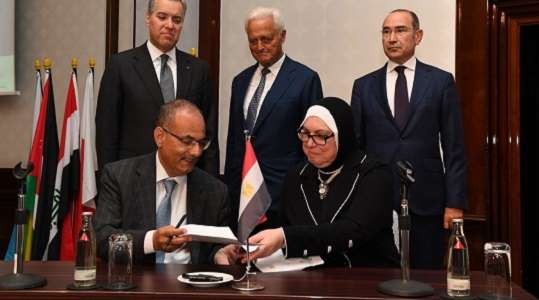The German capital, Berlin, hosted the twenty-fifth Arab-German Economic Forum, in the presence of a large number of businessmen, experts and those interested in Arab-German relations.
In the opening session, the Secretary-General of the Arab-German Chamber, Abdel Aziz Al-Mikhlafi, delivered a speech in which he welcomed Minister Nevin Jameh, Minister of Trade and Industry of Egypt, the guest of honor of the forum and the participants and attendees, he stressed the importance of the economic forum in strengthening the Arab economic partnership during the past twenty-five years, which turned into one of the constants of Arab-German economic relations and an affirmation of the sustainability of the Chamber's work.
As for the Chamber’s president, the former Federal Minister, Dr. Peter Ramsauer, during his speech at the forum, he stressed the great development of Arab-German economic relations, among the most prominent of these developments was the signing of an agreement between Siemens and Egypt to establish and modernize railways, which is the largest agreement for the company since its inception 175 years ago. This is in addition to the distinguished cooperation between Arab countries and Germany in the field of energy in general and renewable energy in particular, which is gaining increasing importance in light of the current developments in Ukraine and the resulting energy crisis.
In her turn, the Egyptian Minister of Trade and Industry, Nevin Gamea, emphasized in her speech the depth of Egyptian-German relations, which this year is celebrating its seventieth anniversary, in addition to the qualitative leap in relations between the two countries since President Abdel Fattah El-Sisi’s visit to Germany in 2015. Especially that Egypt is witnessing major economic transformations in the field of industry and investment, where in addition to the great progress that has been achieved in the field of basic infrastructure, investment laws have been developed to facilitate foreign investments in Egypt.
In his speech, the Ambassador of the Lebanese Republic and Dean of the Arab Diplomatic Corps, Dr. Mustafa Adib, pointed out the importance of the Arab-German Economic Forum and other events organized by the Arab-German Chamber of Commerce in promoting the Arab-German economic partnership. He also noted the good reputation enjoyed by German products in the Arab world, stressing that Arab-German economic relations are more than just an exchange of goods, as they also include the transfer of German technology and knowledge to the Arab countries. He called on German companies to invest and work directly in the Arab countries, where the population of the Arab world is more than 400 million people, the largest part of them are young people, in addition to the strategic location of the Arab countries.
In his speech, the CEO of the Federation of German Chambers of Commerce and Industry, Dr. Volka Trier, addressed the challenges posed by the Corona pandemic, in addition to the war in Ukraine and additional challenges in the field of supply chains and energy supplies, which also require more joint cooperation between Arab countries and Germany.
After the opening ceremony, a cooperation agreement was signed between the Egyptian Ministry of Trade and Industry and the Arab-German Chamber, which was signed by Minister Nevin Jameh on the Egyptian side and the Chamber's Secretary-General Abdel Aziz Al-Mikhlafi.
Within the framework of the forum, a special meeting was held between the heads and representatives of the Arab Chambers, with the Egyptian Minister of Trade and Industry, Nevin Gamea.
Minister Gamea talked about the investment opportunities and climate in Egypt and the recent legislation approved by the government to facilitate and speed up the investment process. She stressed the importance of the agreements recently signed between Egypt, the UAE and Jordan, which include many vital sectors, and aim to implement strategic projects that will benefit the three signatories to the agreements. Pointing out that these agreements will be expanded in the future to include other Arab countries. She touched on the prominent role that the private sector can play in this field.
The meeting also touched upon the obstacles that hinder the development and maximization of the movement of trade and investment between Arab countries, foremost among them is the freedom of movement of Arab businessmen and investors, as well as the freedom of capital movement, in addition to the commodity protection pursued by many Arab countries.
The importance of developing and adopting an Arab strategy for maritime and logistical connectivity was stressed. It was also agreed during the meeting that the Union of Arab Chambers would prepare a working paper that would serve as a strategy to activate joint Arab action in light of global developments that necessitate benefiting from the capabilities and resources enjoyed by Arab countries, which contributes to achieving commercial, agricultural, industrial and investment integration.
It was agreed that the working paper would be presented to Her Excellency Minister Nevin Jameh in her capacity as the President of the Economic and Social Council for this session, in order to be discussed by the Arab Ministers of Economy, Trade and Industry during the meetings of the Council. Then, it was submitted by the Union of Arab Chambers to Arab leaders, presidents and kings, in the economic, development and social summit meetings to be held in Mauritania during January 2023.
The forum’s working sessions dealt with several topics, including transportation and logistical support, development and waste recycling, the Fourth Industrial Revolution, the possibility of financing and investment, food security, and the future of business after the Corona pandemic. This is in addition to a plenary session, attended by a number of Arab ambassadors and representatives of the ministries of foreign affairs and economy, to discuss the prospects for Arab-German relations.
Source (Union of Arab Chambers)

